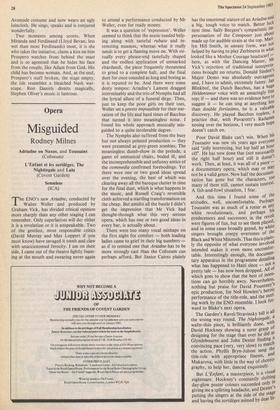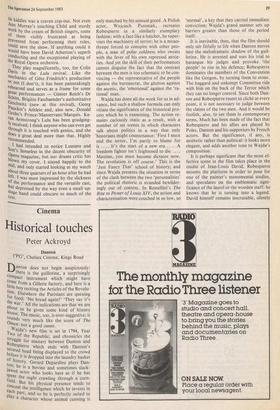Opera
Misguided
Rodney Milnes
Adriadne on Naxos, and Toussaint (Coliseum)
L'Enfant et les sortileges, The Nightingale and Lulu (Covent Garden)
The ENO's new Ariadne, conducted by Walter Weller and produced by Graham Vick, has divided critical opinion more sharply than any other staging I can remember. Only superlatives will do: either it is a revelation or it is unspeakable. Two of the gentlest, most responsible critics (David Murray and Max Loppert if you must know) have savaged it tooth and claw with unaccustomed ferocity. I am on their side. I came out of the theatre lightly foam- ing at the mouth and swearing never again
to attend a performance conducted by Mr Weller, even for ready money.
It was a question of 'expression'. Weller seemed to think that the music needed help- ing along with tasteful rubato and in- teresting nuances, whereas what it really needs is to get a flaming move on. With vir- tually every phrase-end tastefully shaped and the endless application of unmarked ritardandi, the piece frequently threatened to grind to a complete halt, and the final duet for once sounded as long and boring as it is reputed to be. And there were some dotty tempos: Ariadne's Lament dragged interminably and the trio of Nymphs had all the lyrical allure of a funeral dirge. Then, just to keep the poor girls on their toes, Weller set a presto impossibile for their nar- ration of the life and hard times of Bacchus that turned it into meaningless noise. I found his whole approach musically mis- guided to a quite intolerable degree.
The Nymphs also suffered from the busy but not always pointed production — they were presented as grey-green zombies. The meaningless dumb-show in the prelude, a game of unmusical chairs, boded ill, and the incomprehensible and unfunny antics of the commedia confirmed forebodings. Yet there were one or two good ideas spread over the evening, the best of which was clearing away all the baroque clutter in time for the final duet, which is what happens in the music, and Russell Craig's reversible cloth achieved a startling transformation on the cheap. But amidst all the bustle I didn't get the impression that Mr Vick had thought-through what this very serious opera, which has one or two good ideas in every bar, is actually about.
There were too many vocal mishaps on the first night for comfort — both leading ladies came to grief in their big numbers as if to remind one that Ariadne has to be more strongly cast than the Coliseum can perhaps afford. But Janice Cairns plainly has the emotional stature of an Ariadne and a big, tough voice to match. Better luck next time. Sally Burgess's sympathetic ny personation of the Composer just about made up for audible strain at the top. Marl- lyn Hill Smith, in uneasy form, was not helped by having to play Zerbinetta in what looked like a Mother Courage headscarf here, as with the Dancing Master, Mr Vick's rejection of traditional interpreta- tions brought no returns. Donald Sinden s Major Domo was absolutely outrageous and, I have to admit, extremely funny. Jan Blinkhof, the Dutch Bacchus, has a huge Heldentenor voice with an amazingly free top; if — and there was no evidence here to suggest it — he can sing at anything less than double fortissimo, he is a valuable discovery. He played Bacchus topless, a practice that, with Pavarotti's Radames nosing over the horizon, I very much hope doesn't catch on.
Poor David Blake can't win. When his Toussaint was new six years ago everyone said 'jolly interesting, but lop half an hour off'. He has now done that (not necessarily the right half hour) and still it doesn t work. Then, at least, it was all of a piece a documentary opera, which may or mg not be a valid genre. Now half the documen- tation has gone but the characters, too many of them still, cannot sustain interest. A fish-and-fowl situation, I fear.
And this time I found some of the attitudes, well, uncomfortable. Perhaps Toussaint was as much of a rotter as anY white revolutionary, and perhaps his predecessors and successors in the revolt were figures of fun, but to see them played, and in some cases broadly guyed, by white singers brought creepy overtones of the Black and White Minstrels. That this is plain- ly the opposite of what everyone involved intended makes it even more uncomfor- table. Interestingly enough, the documen- tary apparatus in the programme detailing what has happened to Haiti since — not a,. pretty tale — has now been dropped. All 01 which goes to show that the best of inten- tions can go horribly awry. Nevertheless' nothing but praise for David PountneY.s epic production, for Neil Howlett's heroic performance of the title-role, and the sterl- ing work by the ENO ensemble, I look for- ward to Blake's next opera. The Garden's Ravel/Stravinsky bill is all the wrong way round. The Nightingale, a wafer-thin piece, is brilliantly done, With, David Hockney showing a surer grasp of designing for the stage than ever he did at Glyndebourne and John Dexter finding a convincing pace (very, very slow) to match the action. Phyllis Bryn-Julson sang the, title-role with appropriate finesse, and Makarova, with little in the way of choreo- graphy, to help her, danced exquisitely. But L'Enfant, a masterpiece, is a visual nightmare. Hockney's constantly shifting day-glow poster colours succeeded only I,11 giving me a splitting headache, and Dexter s putting the singers at the side of the star and having the sortileges mimed by dear lit- tle kiddies was a craven cop-out. Not even Ann Murray's touching Child and sturdy work by the cream of British singers, some °f them visibly frustrated at being Prevented from performing their roles, could save the show. If anything could it would have been David Atherton's superb conducting and the exceptional playing of the Royal Opera orchestra. They play magnificently, too, for Colin Davis in the Lulu revival. Like the mechanics of GOtz Friedrich's production or not (I don't), it has been painstakingly rehearsed and serves as a frame for some great performances — Gunter Reich's Dr ,SchtM, Brigitte Fassbaender's authoritative "eschwitz (new at this revival), Georg Paucker's Athlete and, also new, Donald Grobe's Prince/Manservant/Marquis. Ka- ren Armstrong's Lulu has been grudging- IY received; I think anyone who can even get through it is touched with genius, and she does a great deal more than that. Highly recommended. I had intended to notice Lumiere and Son's Senseless in the decent obscurity of Q,Pera magazine, but our drama critic has blown my cover. I stayed happily to the end, and only started looking at my watch about three quarters of an hour after he had left. I was most impressed by the slickness of the performance and the versatile cast, but depressed by the way even a small up- stage band could obscure so much of the
text.







































 Previous page
Previous page